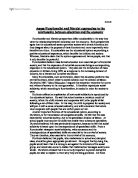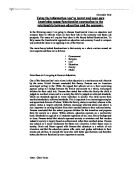Durkheim believed that pupils, who misbehaved in school and disrupted class, should be given appropriate punishment. He argued that by doing this, pupils would learn that it is wrong to act against the interests of the social group, and would also come to realise that misbehaviour damages society as a whole. Durkheim stressed that it is not only important to punish disruptive pupils, but also to explain to them why they are being punished. All these processes of secondary socialisation, described by Durkheim, contribute to value consensus and the specialised division of labour.
Parsons (1961 ‘The school class and the social system’) argued that school is necessary, because it bridges the gap, between primary socialisation in the family and adult society. He argued that after primary socialisation, the school becomes the focal socialising agency, and it prepares children for their future adult roles. According to Parsons, the school is an important part of socialisation because it judges the children on universalistic standards instead of the particularistic way they are judged by kin. It also focuses on achieved status rather than ascribed status. Parsons believed that this preparation for the child is important, because industrial society is becoming increasingly based upon, universalistic standards and achieved status. The school, therefore, reflects the same meritocratic principles that operate in the wider society.
Parsons suggested that the meritocratic principals of schools, encourages all pupils to achieve, and enables them to receive an equality of opportunity. Therefore, pupils that achieve a high level of academic attainment and those that achieve a low level, will each see the system as just and fair, because they both had the same chance. According to Parsons, this process of differential reward for differential achievement is the mechanism behind role allocation.
Davis and Moore (1967 ‘Some principles of stratification’) described this theory of role allocation in more detail. They argued that, pupils who do well in school are rewarded with occupations that have high status and large salaries, and those that achieve little are allocated to jobs of lesser importance. According to Davis and Moore, these inequalities of status can be justified, because advanced industrial society requires a diverse workforce, where people with high abilities are needed for the most functionally important jobs.
There are a number of criticisms that have been made about the functionalist approach to education and the economy. Many sociologists have criticised the whole functionalist perspective, the one that has most relevance to Durkheims argument, is whether value consensus actually exists at all in modern society. Post modernists have argued that in a fragmented and multi-cultural society, different groups have different values. Therefore, how can the educational system succeed in transmitting the values of society as a whole?
Both Durkheim and Parsons have been criticised, particularly by Marxists, who have argued that the values of school and the purpose of job training, may not reflect the needs of society, but the interests of a ruling class. There have also been arguments about whether schools are meritocratic, some have suggested that the educational system largely reflects and transmits the inequalities of society.
Davis and Moore’s argument about role allocation has been criticised. Research has indicated that the relationship between academic qualifications and occupational status is weak. It has been argued that other factors, such as class, race and gender may play a bigger part in determining occupational status. It has also been suggested that even academic attainment itself, is affected by the pupils’ class, race and gender. Some sociologists also believe that intelligence has little effect upon academic attainment.
The Marxist approach to the relationship between education and the economy, places emphasis on the part the schools play in preparing children for their future working roles, in terms of both skills and values. Marxism sees the educational system as an ideological state apparatus, which is used by the ruling class to transmit their capitalist values, in order to protect their own interests. Althusser (1971 ‘Ideology and ideological state apparatuses’) believed that the ruling class, use the educational system to legitimate and reproduce class inequalities generation after generation, and to disguise their capitalist values as common shared values.
Bowles and Gintis (1976 ‘Schooling in Capitalist America’) believe that the social interactions and relationships that occur in the workplace, mirror the social interactions and relationships that take place in the educational system. They called this the correspondence principle, and used it to try and understand how the educational system works.
Bowles and Gintis examined the values, which they claim, are present in the hidden curriculum and underlie the subjects that are taught in school. They believe that it is not the content of the lessons, that instils capitalist values, but the way they are taught. For example, in the workplace there is a hierarchical structure of managers of above labourers, and in school, teachers above pupils. Bowles and Gintis suggested that the main purpose of school is to produce a willing, subservient workforce that will continue to help make profits for the ruling class and not challenge their dominance of society. They believe that the principles of hierarchy and lines of command in schools, prepares pupils for their future employment, where they will accept orders and respect the authority of supervisors and managers.
Bowles and Gintis went on to suggest that pupils are deliberately over taught at school, to ensure that there is always a surplus of knowledgeable people. This creates competition on the job market and allows employers to keep wages low. Bowles and Gintis argued that the educational system is not open, it reflects the power of the ruling class, and this ensures that its members retain senior positions in society. The belief in equality of opportunity masks the unfairness of the system. Bowles and Gintis claim that pupils with wealthy and powerful kin tend to acquire high qualifications in school and obtain high-powered jobs when they leave. Whereas working class pupils learn to unquestioningly adapt to the needs of the ruling class, therefore becoming conformist workers.
Bowles and Gintis have been criticised for their controversial view of the educational system, mainly because they appear to exaggerate the correspondence between work and education, and fail to provide adequate evidence to support their case.
Hickox (1982 ‘The Marxist sociology of education: a critique’) criticised the correspondence principle, arguing that (in Britain) the introduction of compulsory education for the masses, came long after the onset of industrialisation. There was therefore a period when the workforce was not shaped by education, and during this time capitalism was unaffected. Bowles and Gintis have been criticised for assuming that pupils are actually influenced by the hidden curriculum. Studies, such as those conducted by Willis (1977 ‘Learning to Labour’), have showed that many pupils are not passive recipients of education, instead they have little respect for school rules and fight the authority of teachers. Reynolds (1984 ‘Relative autonomy reconstructed’) argued that the formal curriculum in capitalist Britain, does not seem designed to teach either the skills needed by employers, or uncritical passive behaviour which makes workers easy to exploit. In fact, the criticism often made of schools, is that they are too academic and the subjects taught are not work related.
Richard Scase (1977 ‘Industrial Society: Class, Cleavage and Control’) interviewed a sample of English workers, and found that only 2.5% of them felt that educational qualifications were an important factor in determining social class. The rest of the sample felt that family background and economic factors were more important. This would suggest that education has not succeeded in legitimating inequality.
Reynolds criticised Bowles and Gintis for not adequately explaining how the economy shapes the educational system. He argued that it is impossible for the capitalist state to exercise complex control over schools, because local authorities and teachers have a considerable amount of freedom and independence in the way schools are organised. Bowles and Gintis’s argument about the ruling class manipulating the educational system relies at the most basic level, on some sort of conspiracy between employers and teachers.
To conclude, the Functionalist perspective views education as a vital part of society, which turns pupils into model citizens and has a positive impact on the economy and society as a whole. Education also produces a diverse workforce, in a way that is fair to everyone, and it compliments the requirements of the economy perfectly. The Marxist perspective views education as a part of society that is vital for the ruling class, because it reproduces the unequal distribution of wealth and power, by turning working class pupils into conformist workers. It therefore sees education as an ideological tool, used by the upper classes to exploit the working classes.
Ref: Haralambos and Holburn (2000) Sociology: Themes and
Perspectives (fifth edition)







